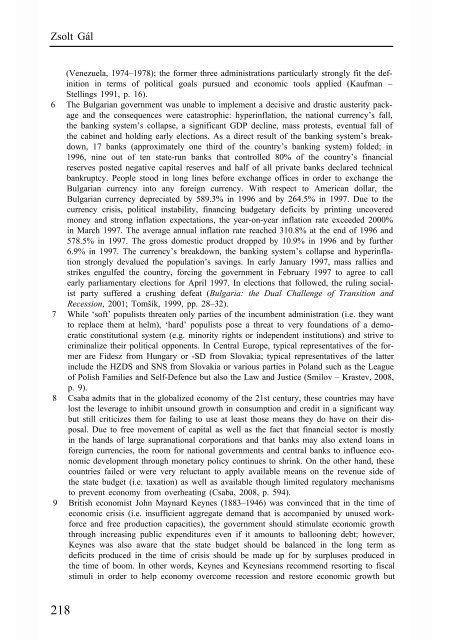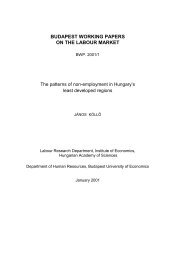national populism and slovak â hungarian relations in - MEK
national populism and slovak â hungarian relations in - MEK
national populism and slovak â hungarian relations in - MEK
Create successful ePaper yourself
Turn your PDF publications into a flip-book with our unique Google optimized e-Paper software.
Zsolt GálNational Populism <strong>and</strong> Slovak – Hungarian Relations <strong>in</strong> Slovakia 2006 – 2009. Forum M<strong>in</strong>ority Research Institute Šamorín – Somorja, 2009(Venezuela, 1974–1978); the former three adm<strong>in</strong>istrations particularly strongly fit the def<strong>in</strong>ition<strong>in</strong> terms of political goals pursued <strong>and</strong> economic tools applied (Kaufman –Stell<strong>in</strong>gs 1991, p. 16).6 The Bulgarian government was unable to implement a decisive <strong>and</strong> drastic austerity package<strong>and</strong> the consequences were catastrophic: hyper<strong>in</strong>flation, the <strong>national</strong> currency’s fall,the bank<strong>in</strong>g system’s collapse, a significant GDP decl<strong>in</strong>e, mass protests, eventual fall ofthe cab<strong>in</strong>et <strong>and</strong> hold<strong>in</strong>g early elections. As a direct result of the bank<strong>in</strong>g system’s breakdown,17 banks (approximately one third of the country’s bank<strong>in</strong>g system) folded; <strong>in</strong>1996, n<strong>in</strong>e out of ten state-run banks that controlled 80% of the country’s f<strong>in</strong>ancialreserves posted negative capital reserves <strong>and</strong> half of all private banks declared technicalbankruptcy. People stood <strong>in</strong> long l<strong>in</strong>es before exchange offices <strong>in</strong> order to exchange theBulgarian currency <strong>in</strong>to any foreign currency. With respect to American dollar, theBulgarian currency depreciated by 589.3% <strong>in</strong> 1996 <strong>and</strong> by 264.5% <strong>in</strong> 1997. Due to thecurrency crisis, political <strong>in</strong>stability, f<strong>in</strong>anc<strong>in</strong>g budgetary deficits by pr<strong>in</strong>t<strong>in</strong>g uncoveredmoney <strong>and</strong> strong <strong>in</strong>flation expectations, the year-on-year <strong>in</strong>flation rate exceeded 2000%<strong>in</strong> March 1997. The average annual <strong>in</strong>flation rate reached 310.8% at the end of 1996 <strong>and</strong>578.5% <strong>in</strong> 1997. The gross domestic product dropped by 10.9% <strong>in</strong> 1996 <strong>and</strong> by further6.9% <strong>in</strong> 1997. The currency’s breakdown, the bank<strong>in</strong>g system’s collapse <strong>and</strong> hyper<strong>in</strong>flationstrongly devalued the population’s sav<strong>in</strong>gs. In early January 1997, mass rallies <strong>and</strong>strikes engulfed the country, forc<strong>in</strong>g the government <strong>in</strong> February 1997 to agree to callearly parliamentary elections for April 1997. In elections that followed, the rul<strong>in</strong>g socialistparty suffered a crush<strong>in</strong>g defeat (Bulgaria: the Dual Challenge of Transition <strong>and</strong>Recession, 2001; Tomšík, 1999, pp. 28–32).7 While ‘soft’ populists threaten only parties of the <strong>in</strong>cumbent adm<strong>in</strong>istration (i.e. they wantto replace them at helm), ‘hard’ populists pose a threat to very foundations of a democraticconstitutional system (e.g. m<strong>in</strong>ority rights or <strong>in</strong>dependent <strong>in</strong>stitutions) <strong>and</strong> strive tocrim<strong>in</strong>alize their political opponents. In Central Europe, typical representatives of the formerare Fidesz from Hungary or -SD from Slovakia; typical representatives of the latter<strong>in</strong>clude the HZDS <strong>and</strong> SNS from Slovakia or various parties <strong>in</strong> Pol<strong>and</strong> such as the Leagueof Polish Families <strong>and</strong> Self-Defence but also the Law <strong>and</strong> Justice (Smilov – Krastev, 2008,p. 9).8 Csaba admits that <strong>in</strong> the globalized economy of the 21st century, these countries may havelost the leverage to <strong>in</strong>hibit unsound growth <strong>in</strong> consumption <strong>and</strong> credit <strong>in</strong> a significant waybut still criticizes them for fail<strong>in</strong>g to use at least those means they do have on their disposal.Due to free movement of capital as well as the fact that f<strong>in</strong>ancial sector is mostly<strong>in</strong> the h<strong>and</strong>s of large supra<strong>national</strong> corporations <strong>and</strong> that banks may also extend loans <strong>in</strong>foreign currencies, the room for <strong>national</strong> governments <strong>and</strong> central banks to <strong>in</strong>fluence economicdevelopment through monetary policy cont<strong>in</strong>ues to shr<strong>in</strong>k. On the other h<strong>and</strong>, thesecountries failed or were very reluctant to apply available means on the revenue side ofthe state budget (i.e. taxation) as well as available though limited regulatory mechanismsto prevent economy from overheat<strong>in</strong>g (Csaba, 2008, p. 594).9 British economist John Maynard Keynes (1883–1946) was conv<strong>in</strong>ced that <strong>in</strong> the time ofeconomic crisis (i.e. <strong>in</strong>sufficient aggregate dem<strong>and</strong> that is accompanied by unused workforce<strong>and</strong> free production capacities), the government should stimulate economic growththrough <strong>in</strong>creas<strong>in</strong>g public expenditures even if it amounts to balloon<strong>in</strong>g debt; however,Keynes was also aware that the state budget should be balanced <strong>in</strong> the long term asdeficits produced <strong>in</strong> the time of crisis should be made up for by surpluses produced <strong>in</strong>the time of boom. In other words, Keynes <strong>and</strong> Keynesians recommend resort<strong>in</strong>g to fiscalstimuli <strong>in</strong> order to help economy overcome recession <strong>and</strong> restore economic growth but218








![Letöltés egy fájlban [4.3 MB - PDF]](https://img.yumpu.com/50159926/1/180x260/letaltacs-egy-fajlban-43-mb-pdf.jpg?quality=85)







